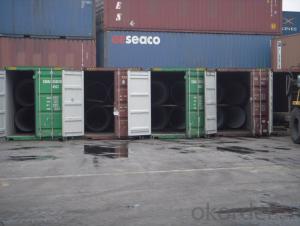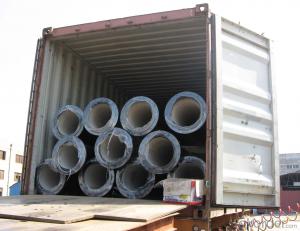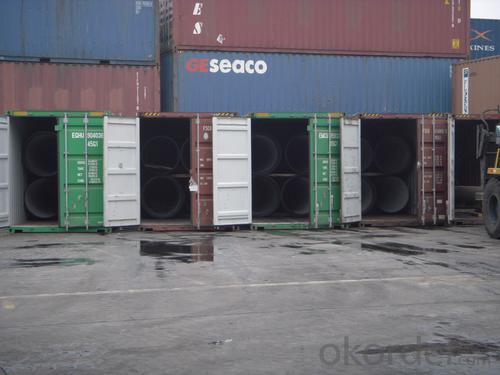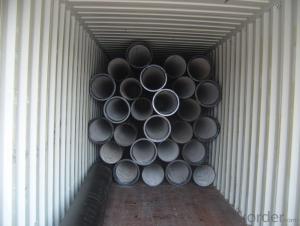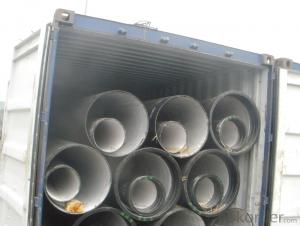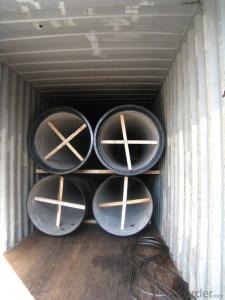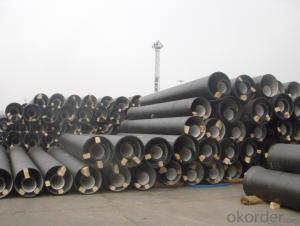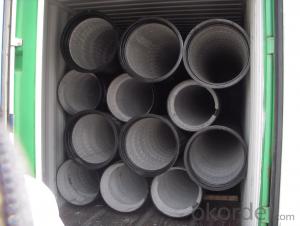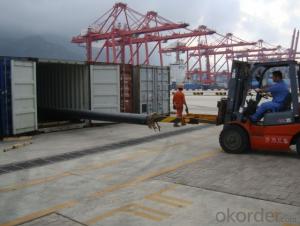DUCTILE IRON PIPE AND PIPE FITTINGS C CLASS DN1500
- Loading Port:
- Tianjin
- Payment Terms:
- TT OR LC
- Min Order Qty:
- 33 pc
- Supply Capability:
- 3000 pc/month
OKorder Service Pledge
OKorder Financial Service
You Might Also Like
· Material : Ductile Cast Iron
· Size Range : DN 80mm to DN 2000mm
· Unit Effective Length : 6m or 5.7m
· Manufacture Standard: ISO 2531:1998/ EN 545:2006/EN 598:2007
· Annual capacity : 200,000 tons
· Coating Exterior: Zinc 130g/m2 according to ISO 8179-1 and bitumen coating 70 microns.
· Cement Interior: Portland Cement/ High Alumina Cement/ Sulphate Resisting Cement Lining according to ISO 4179
· Special requirements on external coating and internal lining can be applied
· We also provide accessories such as SBR/EPDM rubber gaskets, lubricant paste, pipe caps, PE sleeves, etc.
Additional Parts:
Each pipe is strictly inspected according to related standard to ensure permanently high performance.
Easy Installation at site and service free for life
Long Service Lifespan
Quotation will arrive you within 24hours once we get your inquiry.
We guarantee offering you a competitive price.
A copy of original inspection reports of pipes will be offered after shipment.
Photos of loading process will be sent to the customer after shipment effect.
We will follow-up the delivery progress after shipment effect and update to the customer on weekly basis.
- Q: Are ductile iron pipes suitable for landfill leachate collection?
- Yes, ductile iron pipes are suitable for landfill leachate collection. Ductile iron pipes have excellent corrosion resistance, which is crucial for handling landfill leachate that can contain various corrosive substances. These pipes also have high strength and durability, allowing them to withstand the pressure and stress of the leachate collection system. Furthermore, ductile iron pipes are known for their ease of installation and maintenance, making them a practical choice for landfill leachate collection systems. Overall, ductile iron pipes offer the necessary properties and characteristics to effectively and efficiently collect landfill leachate.
- Q: Can ductile iron pipes be used for underground fire hydrant systems?
- Yes, ductile iron pipes can be used for underground fire hydrant systems. Ductile iron pipes are known for their strength and durability, making them suitable for underground applications. They have excellent resistance to corrosion and can withstand high pressures, which are essential requirements for fire hydrant systems. Additionally, ductile iron pipes have a long service life, reducing the need for frequent replacements and maintenance, making them a cost-effective choice for fire hydrant systems.
- Q: Are ductile iron pipes resistant to alkali attacks?
- Yes, ductile iron pipes are generally resistant to alkali attacks. The high carbon content and unique microstructure of ductile iron make it highly resistant to corrosion, including attacks from alkali substances.
- Q: What are the common methods for cutting ductile iron pipes?
- Some common methods for cutting ductile iron pipes include using a handheld reciprocating saw with a metal-cutting blade, using a portable bandsaw, using a chop saw with a diamond-tipped blade, and using a pipe cutter specifically designed for ductile iron pipes. Additionally, some professionals may also use oxy-fuel or plasma cutting methods for larger diameter pipes.
- Q: Principles for the antiseptic treatment of ductile iron pipes
- 4. epoxy ceramic liningEpoxy ceramic lining is suitable for sewage pipes and gas pipelines, but because of its difficult manufacturing process and high cost, it has some limitations in its use. Epoxy ceramic lining has a high adhesion and finish. It is an excellent anti-corrosion coating.5. aluminate cement coating or sulphate cement coatingThese two special cement coatings are suitable for internal corrosion protection of nodular iron pipes used in sewage pipes to improve the corrosion resistance of acid and alkali components in sewage.
- Q: Can ductile iron pipes be used for geothermal energy systems?
- Yes, ductile iron pipes can be used for geothermal energy systems. Ductile iron pipes are known for their strength, durability, and resistance to corrosion, making them suitable for various applications, including geothermal energy systems. They can effectively handle the high pressures and temperatures associated with geothermal energy production, making them a reliable choice for transporting hot water or steam. Additionally, ductile iron pipes have a long lifespan, reducing maintenance and replacement costs for geothermal energy systems.
- Q: How do ductile iron pipes handle ground movement or settlement?
- Ductile iron pipes are renowned for their remarkable strength and flexibility, enabling them to effectively manage ground movement or settlement. Ground movement or settlement pertains to the natural shifts or settling of the earth's surface, which can exert stress on subterranean infrastructure such as pipes. Concerning ground movement, ductile iron pipes possess the advantage of enduring and absorbing the pressure and movement caused by shifting soil. The material's ductility permits the pipes to flex and bend to a certain extent without fracturing. This flexibility aids in distributing the load and minimizing the potential for harm. Additionally, ductile iron pipes exhibit high resistance to cracking or fracturing, even under extreme circumstances. This resilience stems from the material's unique microstructure, which imparts excellent tensile strength and impact resistance. Consequently, ductile iron pipes can withstand external forces and ground settlement without compromising their integrity. To further augment their capacity to handle ground movement or settlement, ductile iron pipes are frequently installed using flexible joints. These joints allow for slight movement and accommodate any shifting or settling of the ground. Furthermore, proper bedding and backfilling techniques are employed during installation to provide added support and stability. Overall, ductile iron pipes possess a proven track record in managing ground movement or settlement. Their strength, flexibility, and resistance to cracking establish them as a dependable choice for subterranean infrastructure, ensuring the durability and efficiency of water distribution systems.
- Q: Are ductile iron pipes suitable for use in hydroelectric dams?
- Yes, ductile iron pipes are suitable for use in hydroelectric dams. They offer high strength, durability, and corrosion resistance, making them ideal for the harsh conditions found in dam environments. Additionally, ductile iron pipes have excellent hydraulic properties and can handle high water pressure, making them a reliable choice for transporting water in hydroelectric dams.
- Q: What are the different sizes available for ductile iron pipe?
- Ductile iron pipes are available in a wide range of sizes to cater to various applications in the water and wastewater industry. The sizes of ductile iron pipes typically range from 3 inches to 64 inches in diameter. The most commonly used sizes include 4 inches, 6 inches, 8 inches, 10 inches, 12 inches, 16 inches, 20 inches, 24 inches, 30 inches, and 36 inches. However, ductile iron pipes can also be manufactured in larger sizes depending on specific project requirements. These different sizes allow for flexibility in designing and constructing water distribution systems, sewage networks, and other infrastructure projects. The selection of the appropriate size depends on factors such as the volume of flow, pressure requirements, and the distance the pipe needs to cover. It is worth mentioning that the size of a ductile iron pipe refers to its internal diameter, also known as the nominal bore. The actual outside diameter of the pipe may vary slightly depending on the manufacturer and the specific dimensions provided. When choosing a size for ductile iron pipes, it is essential to consider factors such as hydraulic capacity, installation requirements, and the compatibility with other pipeline components. Consulting with engineers and industry experts is advisable to ensure the correct size selection for each specific application.
- Q: How do ductile iron pipes handle seismic movements?
- Ductile iron pipes are designed to withstand seismic movements due to their inherent flexibility and high tensile strength. The material's ductility allows it to bend and deform without fracturing, making it more resistant to stress and strain caused by seismic activity. Additionally, the pipes are typically installed with flexible joints that can absorb and accommodate the movement, further reducing the risk of damage or failure during earthquakes. Overall, ductile iron pipes are a reliable choice for underground infrastructure in seismic-prone areas.
Send your message to us
DUCTILE IRON PIPE AND PIPE FITTINGS C CLASS DN1500
- Loading Port:
- Tianjin
- Payment Terms:
- TT OR LC
- Min Order Qty:
- 33 pc
- Supply Capability:
- 3000 pc/month
OKorder Service Pledge
OKorder Financial Service
Similar products
Hot products
Hot Searches
Related keywords
